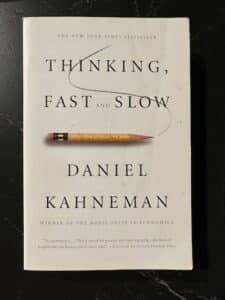Thinking, Fast and Slow by Daniel Kahneman
Reading Time: 3 minutes
Summary
A great intro to the psychology of decision-making and judgment. Kahneman introduces you to the two systems of human thinking, the fast and intuitive System 1 and the deliberate and logical System 2. You’ll learn about priming, anchoring, loss aversion, and ego depletion.
Buy this book on Amazon (Highly recommend)
Key Takeaways
Repeat yourself
“A reliable way to make people believe in falsehoods is frequent repetition, because familiarity is not easily distinguished from truth. Authoritarian institutions and marketers have always known this fact.”
Repeated exposure to ideas, even if they are not true, makes us more likely to believe the ideas and find them credible. If you want people to believe in your idea, make it simple and memorable and then expose people to it many times.
Simplify your language
“If you care about being thought credible and intelligent, do not use complex language where simpler language will do.”
Instead of muddling your ideas with complex and technical language, find the simplest and clearest way to communicate what you want to say. Simple language reduces the cognitive load required to understand ideas, and it will serve you best when you want to communicate with others.
The experiencing self vs. the remembering self
“The experiencing self does not have a voice. The remembering self is sometimes wrong, but it is the one that keeps score and governs what we learn from living, and it is the one that makes decisions. What we learn from the past is to maximize the qualities of our future memories, not necessarily of our future experience. This is the tyranny of the remembering self.”
There are two selves: the remembering self and the experiencing self. What we actually experience at any given time does not necessarily translate to how we remember that experience. This is a critical distinction because the remembering self is the one that creates the stories that drive our beliefs about the events that we experience in life. And those beliefs determine how we think, feel, and operate.
Trust your intuition…sometimes
“Remember this rule: intuition cannot be trusted in the absence of stable regularities in the environment.”
Your intuition is more reliable when there are stable patterns in your environment. So if you find yourself in a completely new environment or set of circumstances, and you have a strong “gut feeling,” don’t give it as much weight as if you’re in a familiar situation. Otherwise, you might end up following the wrong path.
Chance plays a bigger role than you think
“We are prone to overestimate how much we understand about the world and to underestimate the role of chance in events.”
When we look back on life, it’s easy to connect the dots and create rational explanations for why we made particular choices or experienced certain things. But often, these choices and events are determined more by chance than a logical and predictable rational pattern. Don’t forget to consider the role of chance in your life.
Be aware of the planning fallacy
“We focus on our goal, anchor on our plan, and neglect relevant base rates, exposing ourselves to the planning fallacy. We focus on what we want to do and can do, neglecting the plans and skills of others. Both in explaining the past and in predicting the future, we focus on the causal role of skill and neglect the role of luck. We are therefore prone to an illusion of control. We focus on what we know and neglect what we do not know, which makes us overly confident in our beliefs.”
When we make plans in our lives and businesses, we often neglect the important role of base rates, chance, and things outside of our control. This makes us overconfident in our ability to forecast a highly unpredictable future and sometimes make decisions under the illusion that we can control the outcome.
🙈 That's all for now! If you enjoyed this piece...
📚 If you want to discover more great books...
Explore the best books for expanding your mind, the best self-help books, the best philosophy books for beginners, books for people who don't enjoy reading, and more great books.
You might also enjoy these book notes...
- Same as Ever: A Guide to What Never Changes by Morgan Housel
- How to Get Rich by Felix Dennis
- The Body Keeps the Score: Brain, Mind, and Body in the Healing of Trauma by Bessel Van Der Kolk
- Rich Dad Poor Dad by Robert Kiyosaki
- Made to Stick: Why Some Ideas Survive and Others Die by Chip and Dan Health
- How to Win Friends and Influence People by Dale Carnegie Book Summary
- Wanting: The Power of Mimetic Desire in Everyday Life by Luke Burgis
- How to Stop Worrying and Start Living by Dale Carnegie
- Fooled by Randomness: The Hidden Role of Chance in Life and in the Markets by Nassim Taleb
- Thinking in Bets: Making Smarter Decisions When You Don’t Have All the Facts by Annie Duke


